- Home
- Steve Hockensmith
On the Wrong Track Page 14
On the Wrong Track Read online
Page 14
“Ask what?”
A flicker of amusement passed over her pretty face without quite becoming a smile.
“Why I insisted on coming with you. When you were trying to talk me out of it, all you could say was it wasn’t proper. You never addressed my reasons.”
I shrugged—and looked away first. We were in the middle of the street, and I steered us left toward the only buildings in sight with light still aglow in the windows.
“I didn’t think you had a good reason.”
“Exactly. Because you didn’t ask.”
“Alright, then. Why are you so keen on helpin’ Dr. Chan?”
“Why are you?”
I shook my head and chuckled and almost muttered something about the inscrutable ways of Woman. But it was plenty scrutable what a suffragette would make of such a comment, so I let it lie.
“Cuz he seems like a decent feller,” I said.
“That’s all? It has nothing to do with your job?”
“Miss, let me tell you something—I consider that a much better reason than my job.”
“You don’t like being a railroad detective?”
“I don’t mind the ‘detective’ part so much. It’s the ‘railroad’ I ain’t fond of.”
I glanced down and found her still watching me intently.
“You know, you sure are askin’ a lot of questions. What is it that makes me so intriguin’, exactly—my good looks or my way with words? Or is it just sheer animal magnetism?”
She broke off her stare. It was hard to tell in the gloom of night, but it looked like I finally got a blush out of her, too.
“Actually, it’s your job,” she said.
“Oh? You thinkin’ of takin’ Barson’s advice and applyin’ for it?”
This was intended as a funny, of course, and it even got a bark of laughter out of the lady—though the sound of it was far harsher than I’d have thought such a pretty throat could produce. A shout from up ahead cut her off.
“I said get me another drink, Chink!”
It didn’t take any deducifying to know what that meant. We’d found Chan—and just in time.
The yelling was coming from a dilapidated saloon with all the elegance and charm of a sharecropper’s shack. The peeling paint on the sign above the batwings said THORNTON’S BOILER #2. Assuming #2 was a step down from #1, #3 wouldn’t have been much more than a bog hole with a jug in it.
“I hate to keep repeatin’ myself, but this ain’t no place for a lady. Wait here.”
Miss Caveo didn’t break her stride. “As a matter of fact, you are repeating yourself, Mr. Amlingmeyer. And I didn’t appreciate hearing it the first time.”
“Well, try hearin’ it like this, then.” I wrapped my arm around hers again and pulled her to a stop just outside the saloon. “I ain’t just askin’ you to stay out here cuz you’re a lady—or even cuz you’re an especially fine lady I’d hate to see hurt. I’m askin’ cuz I’m the one wearin’ this two-bit badge, so it’s on me to keep Chan and you out of trouble. You’re interested in my job? Fine. Stand back and let me do it. Please.”
As I spoke, the peevish pucker to the lady’s face faded away, and when I was through she was back to her old, sardonic self.
“That was positively inspirational, Otto. The Southern Pacific would be proud.”
“Well, I still ain’t proud of it.” I turned my body toward Thornton’s Boiler but kept my gaze on her. “You’ll wait?”
She nodded. “You’d better hurry. Mr. Wiltrout’s probably down to four by now.”
I didn’t point out that I’d been trying to hurry all along. When a man actually wins an argument with a woman, the last thing he needs to do is kick up a whole new one.
“What the hell is goin’ on here?” I bellowed as I pushed through the batwings into the saloon. I was asking largely for effect, but it was actually a pretty good question.
Burl Lockhart lay flat on his back atop the nearest card table, the coins and greenbacks spread across his stomach and chest rising and falling with his every rafter-rattling snore. Three men—the dingy dive’s only customers—sat around him. They had cards in their hands and frozen smiles on their dirty faces. Two of the men were oil-smeared railroaders, but the third had the grubby, dusty look of a prospector still hunting for his first big strike. Dr. Chan stood nearby, his spectacles askew, his fine suit clothes mussed, and an opened magazine draped over his head like a bonnet. A gray-bearded man in a sweat-yellowed shirt gaped at me from behind the bar.
“Well?” I demanded, coming to a stop legs spread, arms akimbo. I puffed out my chest, hoping the star pinned there would prove sufficient distraction from the emptiness at my hip where a six-gun should’ve been.
“A-ain’t nothin’ wrong,” one of the railroad men stammered. “W-we’re just h-havin’ us a little fun is—”
“The Chinaman tried to take our lazy Susan,” the prospector broke in. He was a big, grimy man—bigger and grimier than me even—and a pussyfooter’s badge obviously didn’t impress him. “I told him he could have the old sot if he played coolie for us for a spell.”
“He said he’d help me move Mr. Lockhart if I bought a round for him and his friends,” Chan said, equal parts angry and ashamed. He pulled the magazine off his head and let it drop to the floor. “Now he won’t do it.”
The big man grinned. “I’m still thirsty.”
“Well, you can just go outside and find yourself a trough, then,” I said. “Cuz these here gentlemen are passengers of the Southern Pacific Railroad, and they’re gettin’ back aboard their train—now.”
I took a step toward the table, meaning to haul Lockhart up and out of there. The railroaders weren’t going to stop me. They were slouching low in their seats, completely cowed.
Their brawny pal, on the other hand, was all bull.
“God damn,” he spat, pulling his chair around to face me fully—and put himself between me and Lockhart. “The Chink said he and the coot was from the Pacific Express, but I didn’t believe it. Shit, what’s next? They gonna start makin’ folks share their seats with niggers? It ain’t right. Someone oughta put a stop to it … huh, boys?”
“Th-that’s right, Pat,” one of the “boys” mumbled.
“I reckon so, Pat,” the other added with a listless nod.
“It’s settled, then.” Pat pointed at Chan with a filthy finger the size of a sausage. “This here slant ain’t gettin’ back on that train.”
I sighed and gave my head a slow, exasperated shake, as if I’d grown weary of the foolishness I had to beat out of such men on a daily basis.
“Let me ask y’all something,” I said. “You ever hear of ‘Big Red’ Amlingmeyer?”
Lockhart cut loose with a raspy roar of a snore. The men gathered around him stayed silent.
“No? Well, that’s alright. I appreciate every opportunity to spread my legend. Now … I can kick your asses one by one or two by two, but I’d prefer you didn’t rush me in a bunch. You’d just get in each other’s way, and it’d make things altogether too easy for me.”
“Ha!” Pat scoffed. “You’re so tough, pussyfooter, what the hell happened to your face?”
“Oh, this?” I waggled my fingers before my swollen nose. “Stand up, and I’ll show you.”
And he actually obliged me, hauling himself off his duff with a crack of his knuckles and a muttered curse. He was only half straightened up, not firm on his feet yet, when I stepped up quick and slammed a fist into his face.
It wasn’t entirely fair, I’ll grant you—but it was entirely satisfying. Pat toppled backward over his chair and ended up a moaning heap on the floor, blood spurting from his nose.
“So, boys—who’s next?” I said to his drinking buddies.
But they weren’t even looking at me. One was staring down at Pat, wide-eyed and white-faced. The other was gawping at something behind me, even wider-eyed and whiter-faced.
“Papà! Papà, what have they done to you?” Miss Caveo called o
ut as she rushed into the room.
When I turned to look at her, my knee-jerk exasperation turned to ice-cold dread, for I also caught sight of the saloonkeeper—and the shotgun in his hands. The barrel of his scattergun hadn’t quite cleared the bar, which was the only reason I still had a neck (and head) for the young lady to save.
“Is he alive? What happened?” Miss Caveo asked, swooping to Lockhart’s side at the card table. “Papà … can you hear me? It’s Lullabelle! Lullabelle’s here!”
Lockhart snorked out another tremendous snore.
“Heavens, no! The vapors!” Miss Caveo swung around to face the bartender. “Please tell me you didn’t serve this man alcohol!”
“I surely did. And why shouldn’t I?”
“You don’t understand—my father has toxophiliphalia of the liver!” Miss Caveo’s brown eyes brimmed with tears, and she aimed an accusatory, trembly-lipped look at Chan. “What kind of servant are you? You know one sip could kill him!”
Despite all he’d been through, Chan managed some decent dramatics himself, hanging his head and mumbling an apology.
Miss Caveo began stroking Lockhart’s thinning gray hair. “I’m taking him to San Francisco for a special cure, but he’s been in such pain lately,” she told the railroaders. “Perhaps … perhaps he wanted to end it all.”
“It ain’t my fault,” the saloonkeeper whined, tucking his shotgun back under the bar. “The old geezer’d had a lot more than a sip before he even came in here.”
“Shut up, Thornton,” one of the railroad men snapped. He turned toward Miss Caveo but couldn’t quite bring himself to look her in the eye. “I’m truly sorry about all this, miss.”
“We didun mean nuh hahm,” Pat added, struggling to sit up with a grubby paw pressed over his nose.
“I hope you can find it in your heart to forgive us, miss,” the other railroader threw in. “Your pa came stumblin’ in here hollerin’ for whiskey, claimin’ he was Burl Lockhart. Well … to be honest, we just pegged him for a crazy old boozehound.”
“That’s the toxophiliphalia,” “Lullabelle” sobbed. “It’s already affecting his brain!”
I stepped over and draped a comforting arm around her shoulders. “There, there, Miss Bernhardt. We’d best get your father back to the train pronto. I hear one of the passengers is a doctor. Maybe he knows something about … uhhh … the old gentleman’s condition. We can have him take a look.”
“Yes … it’s worth a try,” Miss Caveo whispered, fighting to choke back her tears. “I must hold on to hope. I must … strive to … stay strong.”
She began weeping softly, and by the time Chan and I were dragging Lockhart toward the door, she wasn’t the only one—I could’ve sworn I saw Pat wiping at his eyes.
“First you tell Wiltrout your daddy had a stroke,” I said once we were outside. “Then it turns out he’s got a fatal case of tacofaultyfamilia of the liver—and he’s Burl Lockhart?” I shook my head, grinning with incredulous admiration. “Miss, you are without a doubt the most audacious liar I’ve ever seen … and I’m mighty grateful for it.”
“As am I,” Chan panted, straining alongside me like a farm horse in harness—with a limp Lockhart as the plow. “Thank you.”
“You’re welcome, gentlemen,” Miss Caveo replied. “But, please—let’s not call it lying. I’m merely … persuasive.”
Footsteps echoed out of the darkness behind us, and I got set to drop Lockhart and bring up my fists. The gunbelt around Lockhart’s waist—my gunbelt—would offer no help if Pat and his friends were having yet another change of heart. The holster was empty. My Colt was gone.
Fortunately, there was no need for either gunplay or fisticuffs: It was Kip dashing down the street toward us.
“Hurry!” the news butch called to us. “Wiltrout’s tryin’ to—” He skidded to a stop and pointed at Lockhart. “Is he dead?”
“Dead drunk,” I said.
“Well, we better get him to the train quick.” Kip circled around and grabbed Lockhart by the feet. “Your ten minutes was up five minutes ago.”
We set off again at as quick a pace as the toting of a potted Pinkerton will allow.
“So did my brother just leave it to you to find us or is he actually out lookin’, too?” I asked Kip.
“No, he ain’t lookin’ for you,” the kid said. “In fact, he’s been makin’ it a point not to go nowhere.”
We rounded a corner and came within sight of the station. Up ahead, a group of men were gathered by the engine, tugging at something stretched in front of the cowcatcher. For a moment, I thought we had yet another corpse to contend with. But then I saw that the body on the tracks was very much alive and kicking—kicking hard, too, for Bedford the fireman took a boot to the balls that dropped him to his knees.
“That’s it!” Wiltrout roared. “Open up the throttle and flatten the bastard!”
“No need for that, Admiral!” I shouted. “We’re back, Brother!”
Gustav sat up straight. “Alright—we can leave now, Wiltrout.” He got to his feet and walked over to Bedford, who was still doubled up, gasping for breath. “Sorry ’bout crackin’ your huevos. I swear I wasn’t aimin’ for ’em.”
And off he went, heading around the engine to meet the rest of us at the steps into our sleeper. Wiltrout stalked after him, spluttering curses vile enough to strip the paint off a church. Old Red did his best to ignore the abuse, as if it was the buzzing of an angry bee he’d vowed for some reason not to swat. Yet the conductor didn’t abandon his harangue, ranting and raving even as we hoisted Lockhart up into the Pullman.
“You’re through, do you hear me?” he said, hopping in behind us and slamming the door shut. He stomped through the narrow vestibule toward my brother, jostling Kip, Chan, and even Miss Caveo out of his way as he went. “First chance I get, I’m sending another wire to Ogden and San Francisco. Mark my words: You’re going to see some real Southern Pacific detectives on this train before long. If you’re lucky, all they’ll do is toss you and your imbecile brother off. Personally, I’m hoping you’re not so lucky. Now get out of my way—and stay out of my way.”
Wiltrout didn’t wait for Old Red to step aside, shouldering him roughly into the wall as he marched off into the passenger compartment. And just as my brother was getting his footing back, he was stumbling again—as were we all.
The Pacific Express had heaved forward. We were leaving Carlin, hurtling back into the black desert night.
Twenty
NUTS
Or, We Get a Whiff of the Future—and It Doesn’t Smell Good
It was quite the caravan that moved through our sleeper as the Express left Carlin behind. Chan, Miss Caveo, and Kip were in the lead, while my brother and I brought up the rear with Lockhart stretched between us like a whiskey-soaked hammock. We tried to keep our little cavalcade quiet, most of us practically walking on tippytoe, yet we needn’t have bothered: Lockhart was snoring up such a ruckus one passenger after another popped out to shush us. Only one found anything funny about it all.
“Thank God he’s snoring—it’s the only way I know he’s still breathing,” said Mrs. Kier, leaning out of her berth as Gustav and I struggled to shove Lockhart up into his. “You know, he’s lucky you two are so forgiving. After some of the things he said to you tonight, you’d be within your rights to chuck him right off the train.”
With a final grunt, Old Red and I got Lockhart stretched out on his bed.
“We’ll have our revenge yet, ma’am,” I said. “When he wakes up, he’s gonna have such a hangover he’ll wish he was dead. Killin’ him now would be sweet mercy.”
Chester Q. Horner poked his head out into the hallway, his pompadour even more askew than the last time I’d seen it—it didn’t seem to grow from his head so much as balance atop it like a puffy brown mortarboard.
“You wanna show some mercy, Otto?” the drummer said. “Hush up and let folks sleep.”
When he saw Miss Caveo was with us, he grinned
at her lecherously.
“Still out gallivanting with the boys at this hour?” He shook his head and gave her a teasing tsk-tsk. “Diana, Diana, Diana … if you’d wanted a reputation, you should’ve come to me.”
He winked and slipped back into his berth before I could box his ears.
“Never mind him, dear,” Mrs. Kier said. “You gallivant all you want. I would, if I were your age.”
She winked at me, and then she was gone, too.
“Well, I don’t know about ‘gallivanting,’” Miss Caveo whispered, “but I certainly don’t feel sleepy—not after what we just went through. Would anyone care to accompany me to the observation car?”
Of course, I would have gladly accompanied the young lady into the fiery pits of hell had she but asked. Yet I didn’t wish to appear overeager.
“I guess that sounds alright—I ain’t all that tired myself, now that you mention it,” I said. “Only I think the dinin’ car would suit me better. My brother and me ain’t touched a crumb since breakfast.”
“We haven’t, have we?” Old Red muttered absentmindedly, rubbing a hand over his stomach.
“You can count me in, too,” Kip said. “I’m so keyed up I don’t think I’ll ever sleep again.”
So it was decided. Our rescue party would become a dinner party, with one abstention: Chan begged off, saying he needed rest and peace more than food. But before we went, he expressed his gratitude to us all, singling out yours truly for a particularly warm handshake.
“Thank you. You didn’t have to come looking for me. If you hadn’t … I’m afraid to think what would have happened.”
“Don’t mention it, Doc. As a great philosopher once said, ‘It’s every man’s business to see justice done.’”
I probably don’t have to tell you who that “great philosopher” was. I certainly didn’t have to tell Gustav.
As we headed for the dining car behind Kip and Miss Caveo, my brother lagged behind, letting the distance between us and the others stretch out.
“So,” he said, his voice just a quarter notch above a whisper, “Lockhart wasn’t tryin’ to hire hisself a horse when you found him, was he?”

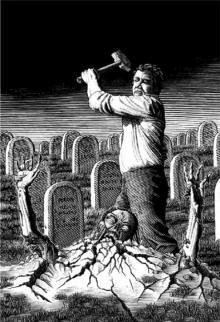 Dawn of the Dreadfuls
Dawn of the Dreadfuls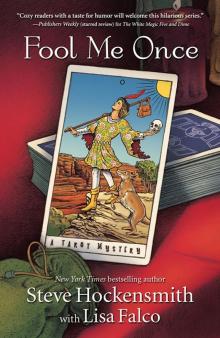 Fool Me Once: A Tarot Mystery
Fool Me Once: A Tarot Mystery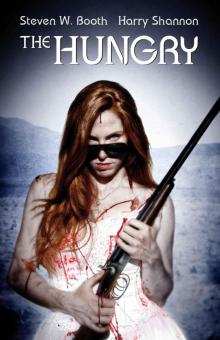 The Hungry
The Hungry Naughty: Nine Tales of Christmas Crime
Naughty: Nine Tales of Christmas Crime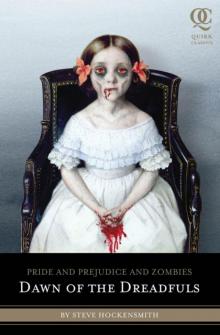 Pride and Prejudice and Zombies: Dawn of the Dreadfuls papaz-1
Pride and Prejudice and Zombies: Dawn of the Dreadfuls papaz-1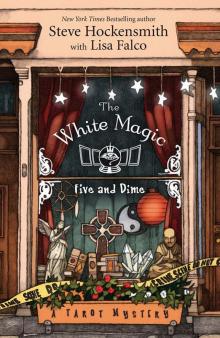 The White Magic Five & Dime (A Tarot Mystery)
The White Magic Five & Dime (A Tarot Mystery)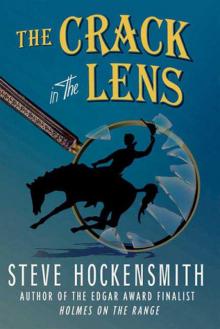 The Crack in the Lens
The Crack in the Lens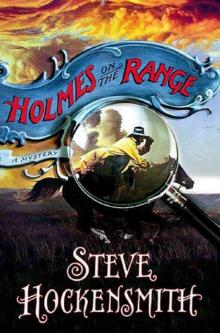 Holmes on the Range
Holmes on the Range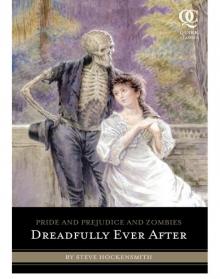 Dreadfully Ever After
Dreadfully Ever After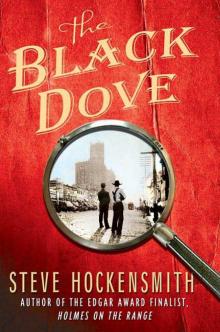 S Hockensmith - H03 - The Black Dove
S Hockensmith - H03 - The Black Dove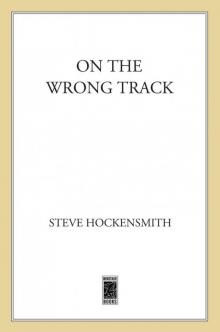 On the Wrong Track
On the Wrong Track Naughty-Nine Tales of Christmas
Naughty-Nine Tales of Christmas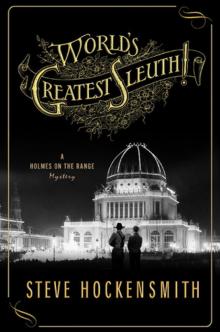 World's Greatest Sleuth!
World's Greatest Sleuth!